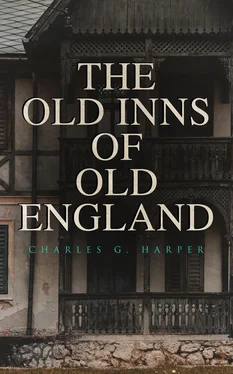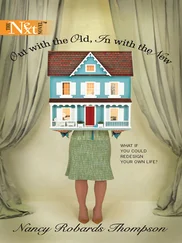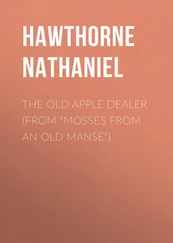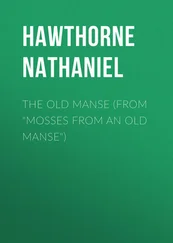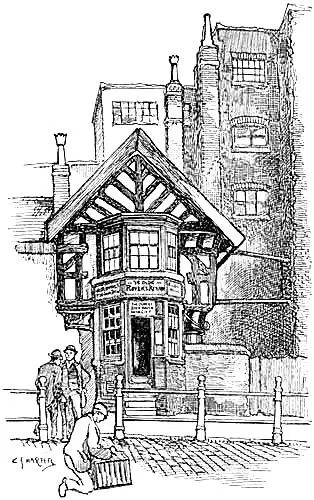
“YE OLDE ROVER’S RETURN,” MANCHESTER.
The “Seven Stars” is of the same peculiar old-world construction as the other houses just enumerated, and is just a humble survival of the ancient rural method of building in this district: with a stout framing of oaken timbers and a filling of rag-stone, brick, and plaster. Doubtless all Manchester, of the period to which these survivals belong, was of like architecture. It was a method of construction in essence identical with the building of modern steel-framed houses and offices in England and in America: modern construction being only on a larger scale. In either period, the framework of wood or of metal is set up first and then clothed with its architectural features, whether of stone, brick, or plaster.
The “Seven Stars,” however, is no skyscraper. So far from soaring, it is of only two floors, and, placed as it is—sandwiched as it is, one might say—between grim, towering blocks of warehouses, looks peculiarly insignificant.
We may suppose the existing house to have been built somewhere about 1500, although there is nothing in its rude walls and rough axe-hewn timbers to fix the period to a century more or less. At any rate, it is not the original “Seven Stars” on this spot, known to have been first licensed in 1356, three years after inns and alehouses were inquired into and regulated, under Edward the Third; by virtue of which record, duly attested by the archives of the County Palatine of Lancaster, the present building claims to be the “oldest Licensed House in Great Britain.”
There is a great deal of very fine, unreliable “history” about the “Seven Stars,” and some others, but it is quite true that the inn is older than Manchester Cathedral, for that—originally the Collegiate Church—was not founded until 1422; and topers with consciences remaining to them may lay the flattering unction to their souls that, if they pour libations here, in the Temple of Bacchus, rather than praying in the Cathedral, they do, at any rate (if there be any virtue in that), frequent a place of greater antiquity.
And antiquity is cultivated with care and considerable success at the “Seven Stars,” as a business asset. The house issues a set of seven picture-postcards, showing its various “historic” nooks and corners, and the leaded window-casements have even been artfully painted, in an effort to make the small panes look smaller than they really are; while the unwary visitor in the low-ceilinged rooms falls over and trips up against all manner of unexpected steps up and steps down.
It is, of course, not to be supposed that a house with so long a past should be without its legends, and in the cellars the credulous and uncritical stranger is shown an archway that, he is told, led to old Ordsall Hall and the Collegiate Church! What thirsty and secret souls they must have been in that old establishment! But the secret passage is blocked up now. Here we may profitably meditate awhile on those “secret passages” that have no secrets and afford no passage; and may at the same time stop to admire the open conduct of that clergyman who, despising such underhand and underground things, was accustomed in 1571, according to the records of the Court Leet, to step publicly across the way in his surplice, in sermon-time, for a refreshing drink.
“What stories this old Inn could recount if it had the power of language!” exclaims the leaflet sold at the “Seven Stars” itself. The reflection is sufficiently trite and obvious. What stories could not any building tell, if it were so gifted? But fortunately, although walls metaphorically have ears, they have not—even in literary imagery—got tongues, and so cannot blab. And well too, for if they could and did, what a cloud of witness there would be, to be sure. Not an one of us would get a hearing, and not a soul be safe.
But what stories, in more than one sense, Harrison Ainsworth told! He told a tale of Guy Fawkes, in which that hero of the mask, the dark-lantern and the powder-barrel escaped, and made his way to the “Seven Stars,” to be concealed in a room now called “Ye Guy Fawkes Chamber.” Ye gods!
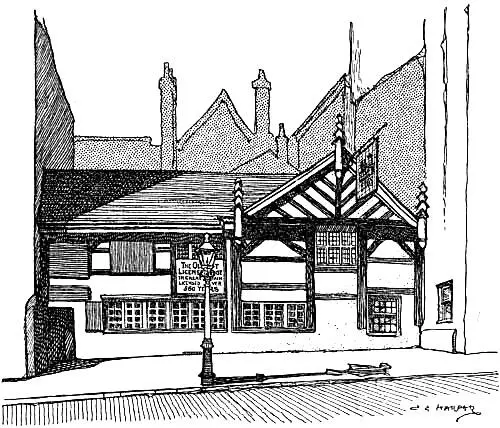
THE OLDEST LICENSED HOUSE IN GREAT BRITAIN: THE “SEVEN STARS,” MANCHESTER.
We know perfectly well that he did not escape, and so was not concealed in a house to which he could not come, but—well, there! Such fantastic tales, adopted by the house, naturally bring suspicion upon all else; and the story of the horse-shoe upon one of its wooden posts is therefore, rightly or wrongly, suspect. This is a legend that tells how, in 1805, when we were at war with Napoleon, the Press Gang was billeted at the “Seven Stars,” and seized a farmer’s servant who was leading a horse with a cast shoe along Withy Grove. The Press Gang could not legally press a farm-servant, but that probably mattered little, and he was led away; but, before he went, he nailed the cast horse-shoe to a post, exclaiming, “Let this stay till I come from the wars to claim it!” He never returned, and the horse-shoe remains in its place to this day.
The room adjoining the Bar parlour is called nowadays the “Vestry.” It was, according to legends, the meeting-place of the Watch, in the old days before the era of police; and there they not only met, but stayed, the captain ever and again rising, with the words, “Now we will have another glass, and then go our rounds”; upon which, emptying their glasses, they all would walk round the tables and then re-seat themselves.
A great deal of old Jacobean and other furniture has been collected, to fill the rooms of the “Seven Stars,” and in the “Vestry” is the “cupboard that has never been opened” within the memory of living man. It is evidently not suspected of holding untold gold. Relics from the New Bailey Prison, demolished in 1872, are housed here, including the doors of the condemned cell, and sundry leg-irons; and genuine Carolean and Cromwellian tables are shown. The poet who wrote of some marvellously omniscient personage—
And still the wonder grew
That one small head could carry all he knew,
would have rejoiced to know the “Seven Stars,” and might have been moved to write a similar couplet, on how much so small a house could be made to hold.
Table of Contents
THE ANCIENT HISTORY OF INNS
Inns, hotels, public-houses of all kinds, have a very ancient lineage, but we need not in this place go very deeply into their family history, or stodge ourselves with fossilised facts at the outset. So far as we are concerned, inns begin with the Roman Conquest of Britain, for it is absurd to suppose that the Britons, whom Julius Cæsar conquered, drank beer or required hotel accommodation.
The colonising Romans themselves, of course, were used to inns, and when they covered Britain with a system of roads, hostelries and mere drinking-places of every kind sprang up beside them, for the accommodation and refreshment alike of soldiers and civilians. There is no reason to suppose that the Roman legionary was a less thirsty soul than the modern soldier, and therefore houses that resembled our beer-shops and rustic inns must have been sheer necessaries. There was then the bibulium , where the bibulous boozed to their hearts’ content; and there were the diversoria and caupones , the inns or hotels, together with the posting-houses along the roads, known as mansiones or stabulia .
Читать дальше
